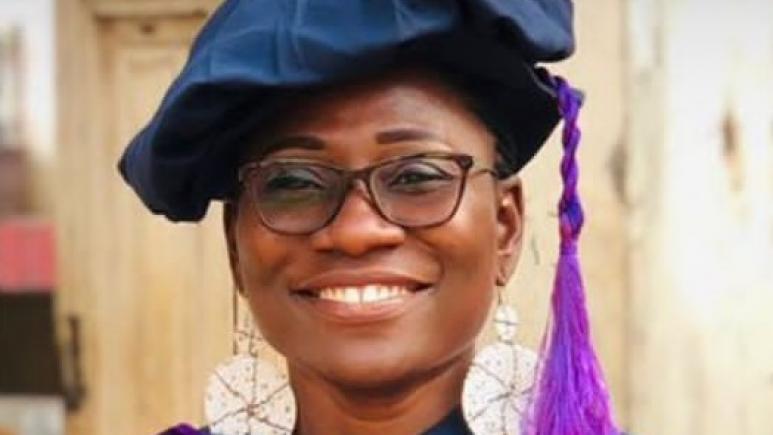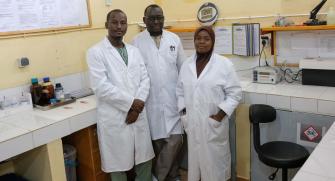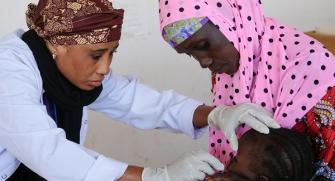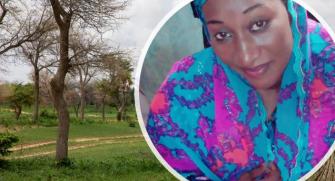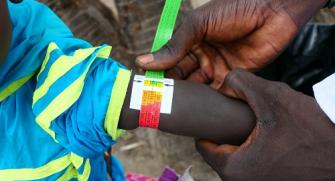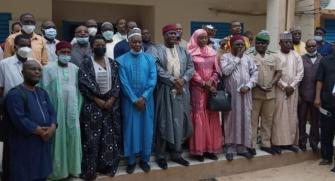Dr Corinne Tchoula: Science, from passion to inspiration
“Studying science has always been an obvious choice for me, says Corinne Tchoula. I wanted to understand how human body function and the impact of the environment on them”. So, with the encouragement of her father, she started studying biochemistry at the University of Yaoundé I, a discipline in which she saw a way to answer her questions. For her master's degree, she chose a subject that straddles the line between the academic and the clinical: hyperlactatemia, one of the undesirable effects of antiretroviral treatments in patients living with HIV. "If understanding is essential, applying one's discoveries is just as important to me," explains Corinne Tchoula.
Science: a lonely profession but one where support counts
With a second master's degree in health sciences in hand, she began to define the outline of the research project that would be the subject of her thesis: male infertility in Cameroon. This major public health issue, which affects about 25% of Cameroonian couples, will confront her with several difficulties, including the taboo associated with male infertility. “Finding men to participate in the study was not easy, she says. I sometimes had to go to private laboratories at 6 AM. to meet them”. And as if tackling a taboo was not enough, Corinne Tchoula will also face the obstacle of finding funding. "Fortunately, throughout my career, people came to my aid. First, my father who will finance my thesis, then women scientists who, through their testimonies, will bring me the strength to overcome the moments of depression and the difficulties that they have often encountered themselves" recalls the biochemist. Science requires many sacrifices: the hardest is certainly to live away from her son born during her thesis, but it is also to face the contextual hazards such as frequent power outages that require to recover samples urgently. Add to that the lack of solidarity between women: it is a woman who for some unknown reason will throw away 50 precious samples, the fruits of long negotiations.
“Women have been my best supporters, but also sometimes the worst obstacles," notes Corinne Tchoula. This is what motivated me to create or integrate organizations to support women in their scientific careers. My dream is that women support each other. This mutual support would constitute an extremely powerful lever to restore the imbalance created by the inequity and thus we will defy the physical law which says that "two bodies of the same nature repel each other".
Inspiring future generations
Corinne Tchoula is a founding member and head of communication and advocacy of Women in Global Health: West Africa, founding member and Secretary General of the Cameroon Society of Microbiology, founding member and Secretary General of Women in Global Health: Cameroon Chapter. She is in the process of creating the Niger Chapter of the Organization for Women in Science for the Developing World (OWSD) with Dr. Mariama Issoufou of Epicentre, but also the Niger Chapter of Women in Global Health. Since September 2020, she has joined the Epicentre Research Center in Maradi, Niger, where she oversees the laboratory.
This was not her first collaboration with the MSF Institute of Epidemiology and Research as she was working in Cameroon with Prof Yap Boum, Epicentre's representative for Africa, on the response to COVID and the evaluation of rapid tests for diagnosis. She is now coordinating the medical biology activities for the various studies underway at the Maradi center, notably on malaria with the DeTACT study, coordinated by MORU, which aims to discover new therapeutic approaches to fight resistant forms of the disease, and on malnutrition with the upcoming launch of a large study that will evaluate a new ready-to-use therapeutic food in young children with severe acute malnutrition. “In this position, I feel like a fish in water because it reconciles my passion for research and my participation in the reflections on current and future projects," enthuses the biochemist. I feel good in this position because I really have the impression that I will be able to provide answers to people". While she has just defended her PhD on February 7, she is already thinking about tomorrow and plans to return to teaching to continue to pass on her knowledge, but also to force herself to stay up to date scientifically, as if she wanted to perfectly fit the Cameroonian expression for women who want to study a lot: "you do the pencil".







